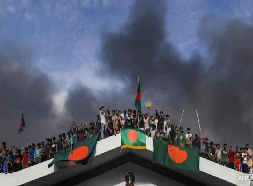Chief Justice of Bangladesh, Obaidul Hassan, has decided to resign after protesters surrounded the Supreme Court on Saturday, issuing a one-hour ultimatum for him to step down, as per reports. The demonstrators warned that they would storm the residences of the top court’s judges and the Chief Justice if he did not comply.
Resignation in the Interest of Judicial Safety
Chief Justice Hassan informed the media that his decision to resign was made with the safety of judges from both the Supreme Court and lower courts across the country in mind. He announced his intention to send his resignation letter to President Mohammed Shahabuddin by Saturday evening.
The latest wave of protests erupted after it was revealed that the Chief Justice Obaidul Hassan had summoned a full-court meeting. Hundreds of protesters, including students and lawyers, marched towards the Supreme Court and occupied its premises. The military was also deployed to safeguard the court.
Allegations of Conspiracy and Controversy
One of the protesters, Abdul Muqaddim, claimed that a conspiracy was underway, led by the Chief Justice, to declare the interim government illegal. “The fascists are trying to use the Supreme Court and the Chief Justice to declare the interim government illegal. That’s why we came to the Supreme Court premises to force the Chief Justice to resign,” Muqaddim stated.
Asif Nazrul, the law adviser to the interim government, pointed to several controversies surrounding Chief Justice Hassan, including allegations that he stayed at the residences of various Awami League leaders while abroad. Asif Mahmud, adviser to the Sports Ministry of the interim government, also demanded the resignation of Chief Justice Obaidul Hassan and the cancellation of the full-court meeting.
Rising Tensions and Resignation of Prime Minister Hasina
In response to the escalating tensions, the Chief Justice postponed the judges’ meeting, as reported. The unrest in Bangladesh has been growing, initially sparked by student protests against a controversial quota system that reserved up to 30% of government jobs for the families of 1971 war veterans. As the protests intensified, the Supreme Court reduced the quotas to 5%.
However, the protests evolved, with demonstrators demanding the resignation of Prime Minister Sheikh Hasina. The resulting violence has led to over 500 deaths and hundreds of injuries. On Monday, Hasina resigned as Prime Minister and fled the country, leading to the formation of an interim government under Nobel Peace laureate Muhammad Yunus.



